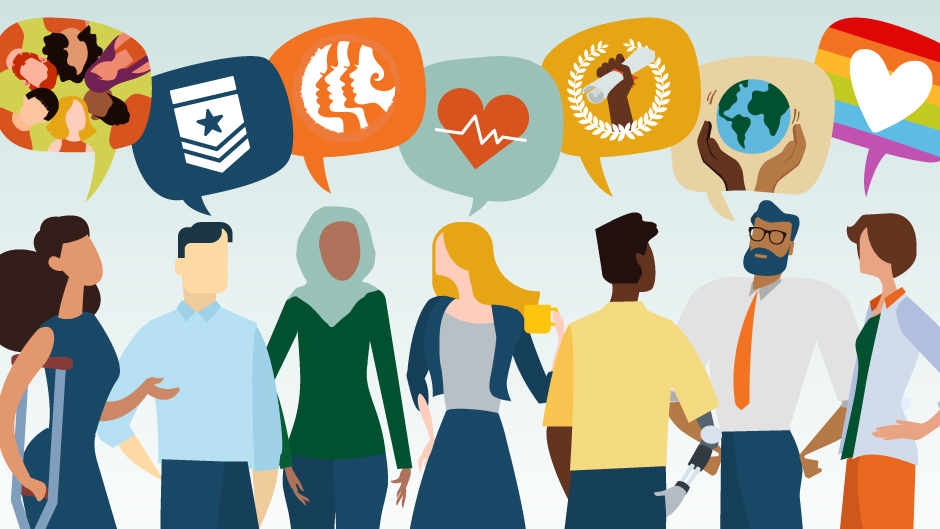Today, the group—which is open to faculty and staff who identify as part of the LGBTQ+ spectrum, as well as to allies—continues to serve as a resource for employees and the University community. Andrew Wiemer, director for the Butler Center for Service and Leadership and chair of the LGBTQ Faculty and Staff Network, along with Meredith Camel, executive director for University Communications and communications committee chair for the group, shared insight into the history and mission of the ERG, and the importance of social advocacy on campus.
What prompted the formation of the LGBTQ Faculty and Staff Network ERG?
Wiemer: The LGBTQ Faculty and Staff Network was initially developed in fall 2013 by Christian Garcia, associate dean and executive director of the Toppel Career Center, and myself. We had colleagues who identified with the LGBTQ+ community, but we lacked the ability to connect as a group and support the inclusion and well-being of LGBTQ employees. Through a very grassroots approach, we held our first meeting on Wednesday, Nov. 13, 2013, and welcomed about 15 people. Following the initial meeting, our outreach continued, and a few months later at the December holiday social we had almost 40 attendees. We realized quickly that there was an interest in expanding.
What has changed since the first meeting in 2013?
Wiemer: Following the initial meetings, we developed a listserv for those who were interested in programming on campus or in the Miami community, educational resources, and social events hosted by the LGBTQ Faculty and Staff Network. In 2014, Human Resources began launching Employee Resource Groups—or ERGs—and asked us to join as one of the pioneer ERGs on campus.
Since then, we've continued to grow in many ways. To start, we developed an executive board with four committees—social, advocacy, education, and communication—and continue to expand our membership listserv, which currently consists of more than 175 individuals from all three campuses. We plan two to three events per semester, allowing members of the community to connect and network.
What can employees expect when joining the LGBTQ Faculty and Staff Network?
Wiemer: All University faculty and staff members are welcome to join the ERG by registering online. Those who sign up as part of the LGBTQ Faculty and Staff Network can expect to learn about events in the community, opportunities to discuss issues, educational sessions, and networking with other LGBTQ faculty and staff members on campus.
As an employee, how did you become involved with the LGBTQ Faculty and Staff Network
Camel: Being part of the University’s LGBTQ Task Force Implementation Committee—which worked to establish the initial IBIS Ally program, the recommendation of a LGBTQ Student Center, gender-inclusive restrooms, and other initiatives to support students through the Division of Student Affairs—really awakened my inner advocate. I saw what a difference these programs made for students and for the faculty and staff members desperately wanting to know how to support their LGBTQ students. Now, through the network, I can help extend support to faculty and staff.
What impact has the ERG had on your career?
Camel: I am forever grateful to the University of Miami for not only giving me a wonderful career for the past 19 years, but also for recognizing my marriage years before it was legal in Florida and throughout the nation. Years ago, my coworkers and colleagues gave me strength through a painful divorce and an even more painful coming out process. Later, I joined the ERG to help make sure that all University faculty and staff members could be their authentic selves without fear of being judged. I want everyone who works at the U to know they have a community waiting to embrace them and to help them feel what I feel—that the U is more than a place to work; it's a place to call home.
My work with the LGBTQ Faculty and Staff network has expanded my social circle to include colleagues on all campuses whom I wouldn't have otherwise met. In any line of business, networking helps to better understand the organization, which leads to more efficient ways of getting things done. Many people from the network have become close friends, and the connection we share as members of the University community reinforces that bond.
What advice would you give to colleagues who are interested in social activism or serving as allies to those in marginalized communities?
Camel: The University of Miami has worked really hard, particularly in recent years, to create enriching, fulfilling opportunities within and outside of the workplace for all members of the University community. There are so many programs, ranging from ERGs to programs from the Office of Institutional Culture and more, where we all have an opportunity to explore our social identities and have meaningful conversations about how we can support one another. Anyone can be an advocate for inclusion and belonging on campus simply by talking to others about different life experiences, reading about social justice topics, taking an honest look at their own biases, and creating a daily intention of human kindness.
Wiemer: My advice to my colleagues who are interested in joining or becoming an ally to any marginalized group is to reach out and join. As part of our ERG, we welcome everyone, including allies, to all of our programming. We believe it is important for our community to connect with everyone on the campus. There are many opportunities to get involved through on-campus or local organizations that are creating change around issues affecting various marginalized groups.
To learn more about the LGBTQ Faculty and Staff Network or to find information about the ERGs at the University of Miami, visit miami.edu/erg.

